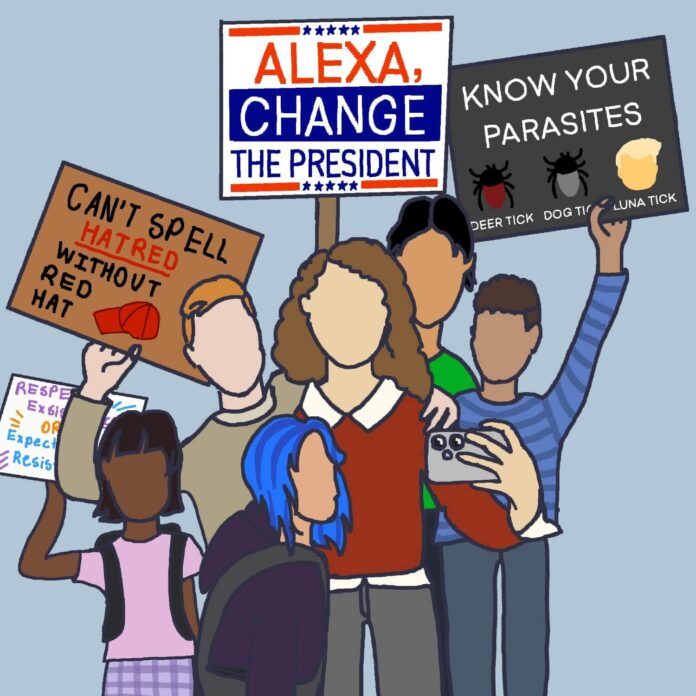Remember when American political protests were something of a rarity? It feels like a figment of an alternate universe. Right now, massive demonstrations are so prevalent that they could be mistaken for an everyday occurrence. Perhaps it’s fitting for a political climate whose narratives are reminiscent of pro wrestling storylines — especially since the current president is in the WWE Hall of Fame.
When Bernie Sanders and Alexandria Ocasio Cortez (AOC) hit the road on the Fighting Oligarchy tour last spring, it felt as though American political engagement was reaching a turning point. As crowds of over 36,000 packed the streets of cities like LA, many began to wonder: what would the coming months of resistance hold?
The answer was… not much.
As it turns out, drawing massive crowds for a political speech doesn’t directly correlate to large-scale political action. These events might have made for entertaining Instagram posts and viral TikTok sound bites, but they weren’t much help in fighting back against Trump’s policy. This summer saw Congress pass a litany of Republican-approved legislation, including the so-called “Big Beautiful Bill,” which is essentially the government flipping you the bird.
Despite these obvious threats to civil liberties, superfluous anti-Trump gatherings remain in full force.
The latest in this string of events is the “No Kings” (or “No Tyrants” in monarchist nations such as Canada and the U.K.) movement. It’s a series of irregularly held protests aimed at fighting, ostensibly, President Trump’s supposed bid to consolidate power into a dictatorship. It also gives aspiring comedians the chance to make signs containing unprecedented phrases such as “Mike Johnson blocked me on Grindr” and “J.D. Vance ate my dog.”
The online sphere has graced us with its own share of shenanigans. In an attempt to target the president’s alleged insecurities regarding crowd sizes, protestors took to social media to brag about the scale of the event compared to Trump’s inauguration. Trump responded with an AI video of himself air-bombing protestors with feces. If that exchange doesn’t encapsulate the current state of political discourse, I don’t know what does.
Trump’s crappy sense of humor notwithstanding, the protestors are undoubtedly correct — these events are massive. But as more people take to the streets and anti-Trump demonstrations become more commonplace, their perceived importance also appears to dwindle. How could this be?
I believe it’s a symptom of a culture that some have called a “crisis of complacency.” As political happenings become more consequential and outlandish by the day, the average person becomes increasingly accustomed to a state of perpetual discontentment with the world around them. The worse things get, the less people care — calamity becomes customary, and tragedy merely melds into daily life.
Perhaps no event is as indicative of our current position as the Watergate scandal, which dominated American headlines for over two years and ultimately forced the sitting president to resign. Had it occurred today, Watergate likely wouldn’t have lasted more than a couple of weeks in the news cycle before an even stranger scandal took its place — perhaps regarding Alligator Alcatraz or whatever Elon Musk is up to nowadays.
This sensationalist yet ultimately apathetic state of mind appears to have wormed its way into the very fabric of so-called American “resistance.” Protests are no longer acts of civil disobedience — they’re social events. Scroll your social media of choice on the day of one such protest, and you’re bound to see countless freedom fighters who were apparently all on one-day contracts. The sardonic skeptic might add that it’s a bit difficult to take an anti-oligarchy demonstration seriously when Walmart sponsors that same event.
It’s easy to look at this new evolution of slacktivism and immediately deem it hopeless, but that may not be the case. In fact, I’d argue that demonstrations like No Kings have the potential to make a massive political impact. The problem lies not in the event itself, but in how its organizers treat it as a one-off when they should use it as a launchpad for political action.
One of the best ways for protest organizers to make inroads toward real change is simple — promote organizations that consistently fight oligarchy over the long term. There is no shortage of such groups — the ACLU and SPLC are prominent examples — and it’s a lot harder for politicians to shrug off concentrated resistance efforts when they don’t have a scheduled start and end date. It’s akin to boycotting — a one-day effort is considered laughable, but those who endure often achieve the desired change.
In addition, protest organizers should make a serious effort to educate their attendees about exactly what they’re fighting for. Most people can scrape together a vague idea of current events, but tragically few are aware of specific happenings. A key tactic of the current administration is to overload the public with headlines until incidents blur into a nebulous, unassailable haze. By utilizing these massive gatherings to educate people about what’s going on, protest leaders will produce precisely what the Trump regime fears most: educated citizens.
These methods are obviously just a starting point, and there’s no doubt that the path forward will be one of great tribulation. But protest organizers should make the most of their opportunity while they command the nation’s attention — if they do it right, real change could be on the horizon.
Contact Mac Ribner at ribner@oxy.edu
![]()































